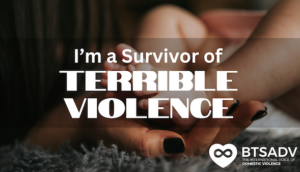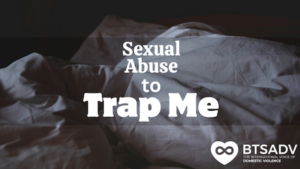For most of us, the holiday season is a promise of warmth, kindness, and sharing happy memories and traditions with those we love most.
But for victims of domestic violence, unfortunately, these months can be wrought with terror and hardship. The holiday season often means more chances to drink alcohol (a well-researched commonality in many intimate partner violence situations) and increased stress because of financial and familial obligations. Abusers can become more brutal during the holiday season; and episodes of violence and coercion often become more frequent. Coupled with the isolation and stresses brought on our world due to the pandemic, this is a recipe for disaster.
Studies have shown that reports of domestic violence actually decrease during the holiday season, and many experts suspect that victims choose not to report during this time for fear of “ruining” the holidays. This belief, however, is founded in the lens that the abuser has enforced upon the victim: that somehow the victim is responsible for the violence that has been inflicted upon them. This is simply not true, and the holiday season presents a unique opportunity for family and friends to spot domestic violence and act.
Signs There Might Be Domestic Violence or Abuse
If you spot one or more of the following behaviors in a friend or family member, there may be a domestic violence situation or an unhealthy relationship in their life. It’s important to think about these behaviors in the context of your loved one’s life.
Sudden withdrawal from family and friends
Is it a tradition for everyone in the family to get together for an ugly sweater party? That
friend who was planning to come–did she have to suddenly cancel just an hour before
the get-together? Think about it: is this part of a larger or recent pattern of behavior?
Abusers often seek to control their victims by cutting them off from family and friends.
Does your friend suddenly seem reluctant to get together, or do they not enjoy activities
they used to? This could be a warning sign of a bigger problem. Oftentimes, the coercion isn’t as explicit as forbidding the victim from seeing someone. Instead, abusers may accuse their victims of not spending enough time with them or insinuating that they don’t like one particular individual or another.
Unexplained or suspicious injuries
A bruise on the arm, marks on the throat–these may be innocent injuries, but they also
could be evidence of domestic violence in your loved one’s life. If you see injuries, ask
about them. If your friend or family member seems uncomfortable answering, that may
be a red flag. Think about any other injuries he or she may have had, and whether those seemed suspicious too.
Possessiveness by their partner
Does your friend seem overly anxious about upsetting their partner? Is your friend
constantly checking their phone? Is their partner demanding to know where they are at
all times and accusing your friend of cheating? These tactics are methods of control —
and are very common in unhealthy relationships and domestic violence situations.
Another common tactic to exert control over a significant other is through public
humiliation, whether overt (demeaning the individual in front of others explicitly) or
through more subtle methods (like “joking”).
Financial control by their partner
If your loved one lacks access to financial resources they should otherwise have, they
may be in a dangerous situation. Abusers know that by restricting their victim’s cash,
they can effectively control them and limit their ability to be independent. Financial
insecurity occurs in almost every domestic violence relationship, and is the number one
reason why victims struggle to leave their abuser.
How Family and Friends Can Help
The holidays remind all of us the importance of family and friendship. If you suspect someone you love is in an unhealthy relationship, read below for ways you can help.
Ask questions, listen and have empathy
Try asking questions. Don’t assume too much, and definitely don’t insert judgement. You want your friend to feel like they can trust you. “Hey, I noticed you have been a little
distant lately. Is everything okay?” or “How’s everything going with (insert partner’s
name)?” are great ways to start. Avoid offering advice, unless your friend asks for it.
Instead listen and offer empathy. It may be hard to understand why your loved one is
tolerating abuse, but remember that your friend is a victim, and has likely been deeply
manipulated.
Offer assistance
If your loved one confirms that abuse is occuring in their relationship, they may need your help. It’s important to help in ways that keep your loved one safe. You need to also consider your own safety as well when offering assistance. Do not assert yourself into an unsafe situation to protect the victim.
A safe way to help a loved one is to connect them with domestic violence support resources. You can also help the victim put together a plan if they decide to leave their abuser. Plan which shelter your friend and their children (if they have any) will go to. Help them pack a bag with important documents, cash, and essentials to make it easier for them to leave in a hurry.
Contact a Domestic Violence Hotline
Call The National Domestic Violence Hotline at 1-800-799-SAFE (7233) or visit its
website at thehotline.org to get connected to local, relevant resources, including
shelters/safe houses.
You can also contact Break the Silence Against Domestic Violence’s Hotline
855-BTS-1777 from 8am-5pm (Pacific Standard Time) 7 days a week to seek
resources or information and get support.
Contact authorities
If your loved one is in immediate, life-threatening danger, it is necessary to contact local law enforcement. The victim may object, and may even beg you not to, but if it means potentially saving their life and their children’s lives it is worth it.
If you or someone you know is in an abusive relationship, there is help. You can visit the Break the Silence Against Domestic Violence website at www.breakthesilencedv.org or chat with one of our helpline advocates at 855-287-1777.
========
Share Your Story
Sharing our stories can be incredibly empowering while also helping others connect with survivors who have similar experiences. If you are inspired to share your story with us, submit here. You can choose to remain anonymous.
You can also donate to BTSADV here.
Photo Credit: Caroline Hernandez, via Unsplash









